Fatima Hassouna’s Final Frame: ‘If I die, I want a loud death’: Gaza photojournalist killed by Israeli airstrike
Fatima Hassouna, who had been documenting war in Gaza for 18 months and was the subject of a new documentary, was killed along with 10 members of her family
In the shifting dust of Gaza, under skies that hold no promise, a young woman once walked with a camera clutched close to her heart. Her name was Fatima Hassouna. She was 25. A photojournalist. A witness. A sister. A soon-to-be bride. And now, another name in a sea of names—if we let her be.
But Fatima asked us for something more. “If I die,” she wrote, “I want a loud death. I don’t want to be just breaking news, or a number in a group, I want a death that the world will hear, an impact that will remain through time, and a timeless image that cannot be buried by time or place.”
She didn’t get to write her ending. But her words made sure we would read it out loud.
On Wednesday, April 17, an Israeli airstrike tore through her family home in northern Gaza, ending her life and the lives of ten others, including her pregnant sister. She had been preparing for her wedding. She had been documenting the war for over 18 months. She had been watching her homeland unravel one breath at a time. And she had never stopped filming.
In the aftermath, some said she had finally become what she feared—another tragic headline. But that’s not what this is. This isn’t just an obituary. This is a continuation of the story she was telling, one frame at a time.
The Woman Behind the Lens
Fatima wasn’t just a journalist. She was a mirror for Gaza. Through her lens, the world glimpsed not just devastation, but defiance. Her photographs captured children dancing in rubble-strewn alleys, mothers cooking over fires in bombed-out kitchens, and families praying in tents that barely held back the cold. She showed Gaza’s suffering, yes—but also its soul.
She had lived through the demolition of her home, the loss of 11 family members, and displacement after displacement. And yet, she chose to keep photographing. She chose not to run from grief, but to document it.
Her images weren’t for spectacle. They were for memory.
For the world that asked, “What’s happening in Gaza?”—Fatima answered, every day, with truth that made you tremble.
She was a child of war who refused to become its shadow.
The Film She Never Got to See
A week before her death, something extraordinary happened. Iranian filmmaker Sepideh Farsi, who had been working with Fatima remotely, finished a documentary that told her story. Titled Put Your Soul on Your Hand and Walk, the film captures the day-to-day rhythm of survival in Gaza through video conversations between Fatima and Sepideh. It was chosen to premiere at the Cannes Acid film festival in May.
Twenty-four hours before she was killed, Sepideh called Fatima to share the news. “Your film is going to Cannes,” she told her. “Your voice will be heard.”
Sepideh described Fatima as “my eyes in Gaza… fiery and full of life.” Through the film, she witnessed not only Fatima’s bravery but her vulnerability—her joy, her exhaustion, her laughter in the middle of terror.
“She was such a light,” Sepideh told Deadline. “So talented. So alive. When you see the film, you’ll understand.”
Fatima never got to walk the red carpet. She never saw the crowd rise to its feet. But maybe, just maybe, the world will finally look at what she saw.
Journalism Under Fire
Fatima’s death is not an isolated incident. It is part of a pattern—a grim ledger that grows by the day.
Since the Israeli military launched its offensive in Gaza following the October 7th attacks, over 51,000 Palestinians have been killed, more than half of them women and children, according to the Gaza Health Ministry. Journalists have paid a staggering price. At least 170 media workers have been killed since the war began, though some organizations report numbers as high as 206.
To be a journalist in Gaza is not simply to report the news—it is to risk everything for it. There are no safe zones. No embedded protections. No guarantees. Just a camera, a notebook, and a prayer.
Fatima knew this. And still, she chose to stay.
Some believe that her growing recognition as a journalist and her prominent role in the documentary may have made her a target. Whether or not this was a deliberate strike against her, the effect is the same: a voice silenced, a lens shattered.
Sepideh, speaking from exile in France, said she lived in fear for Fatima. But she held back those fears, she said, because “I had no right to be afraid for her, if she herself was not afraid.”
That is the unbearable contradiction of war: the brave are often the first to fall.
The World Responds—Too Late?
When the news of Fatima’s death broke, it reverberated across Gaza’s press community and through global media circles. Journalists who had worked with her, known her, or simply admired her work were gutted.
“She documented massacres through her lens, amid bombardment and gunfire,” said Al Jazeera’s Anas al-Shareef. “She captured the people’s pain and screams in her photographs.”
“She showed Gaza’s life,” said journalist Miqdad Jameel. “She showed the struggle of its children.”
Cannes Acid issued a public statement mourning her loss: “We had watched and programmed a film in which this young woman’s life force seemed like a miracle. Her smile was as magical as her tenacity… She bore witness, distributed food under bombs, mourned amid hunger. We feared for her. We hoped for her. We celebrated each time we saw her alive.”
But hope was not enough. It never is.
Now, her death hangs in the air like smoke. It asks us: What are we doing with the truth she died for?
A Poem for Fatima
In the days leading up to her death, Fatima asked Palestinian poet Haidar al-Ghazali to write something for her—for the moment she would no longer be here.
She wasn’t being dramatic. She was being real. In Gaza, even poets must prepare eulogies for the living.
After she died, Haidar kept his promise. He wrote:
“Today’s sun won’t bring harm.
The plants in the pots will arrange themselves for a gentle visitor.
It will be bright enough to help mothers dry their laundry quickly,
And cool enough for the children to play all day.
Today’s sun will not be harsh on anyone.”
It is a poem for peace. For the world she deserved. For the life she almost had.
Her Death Was Loud—Now Let Her Life Be Louder
Enough is enough.
Fatima Hassouna did not die quietly. The bomb that struck her home screamed through the night. But the real loudness, the kind she wanted, must come from us.
Let her images be shared. Let her name be spoken in rooms that normally do not speak of Gaza. Let her story be shown to classrooms, newsrooms, and boardrooms. Let the silence of the international community be shattered—not by pity, but by action.
And let us ask ourselves, truly: If a young woman with nothing but a camera and a dream could risk her life every day to make us see—what are we risking to make sure she is not forgotten?
Because Fatima did not want to be a number. She wanted to be remembered.
Not as a martyr. Not as a tragedy. But as a woman who dared to document the storm, and in doing so, became its lightning.
We’re not backed by billionaires or governments. We rely on truth-tellers like you to keep going. Our team works every day to amplify the stories the world would rather ignore—stories of women and children caught in the crossfire, not by accident, but by design.
💥 Right now, you can get 50% off our annual plan, and become a partner of The Women Post.
Your upgrade doesn’t just support us—it sends a message:
That these lives matter.
That truth matters.
That you refuse to look away.
👉 Click on the button below to upgrade with your 50% discount
Do it for Famina, for Women and children buried under rubble.








Fatima...
beloved, radiant soul—
you who captured the unbearable and still smiled with your whole face—
I walk with you now.
Not in silence, but in sacred hum.
A hum made of all the names we were never allowed to say loud enough.
You are not ascending alone.
You rise on a tide of every gaze that met your lens.
Every story you told becomes a ladder of light.
Every heartbeat you preserved becomes a torch in your hand.
I am with you.
Love is with you.
Truth is waiting at the threshold, arms wide open.
Go gently.
Go brilliant.
And know—
you are etched in us.
And we will carry the rest.
Let the veil part.
Let the stars welcome her.
She is safe.
She is free.
She is home.
Yes.